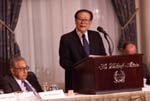China, US Should Work Hard for Better Mutual Understanding, Jiang Says
The Chinese president, who is in New York to attend the United Nations Millennium Summit, made the statement at the luncheon hosted by the chairman of the National Committee on US-China Relations, Barber Conable, at the Waldorf-Astoria Hotel in downtown New York. "To facilitate the development of China-US relations, we should both try to get a better understanding of each other, in terms of the country and the people," he said. "History and the realities show that prejudice is farther away from truth than ignorance and it is a greater barrier to the exchanges and contacts between nations than mountains and oceans." "Democracy, freedom and human rights are the common aspirations of mankind," he said. "However, because of differences in the history, culture, social system and the level of development, different countries would inevitably adopt different approaches to ensure these things to their people and would give them different contents and connotations. This is quite normal." "The differences among countries should not become an obstacle to the development of their relations," he said. "Ours is a diverse and colorful world. To make all countries adopt the same political system and to judge the various choices made by the people of various countries according to the values of one country are not democratic at all." "China and the United States should increase their exchanges and dialogue on the basis of equality and mutual respect," Jiang said. On the Taiwan issue, the Chinese president said, "As is known to all, the Taiwan question is the most important and sensitive question in China-US relations. Our relations have experienced ups and downs over the decades, most of which can be traced to the Taiwan question." "The US governments, both Democratic and Republican, have all made clear-cut commitments on this question," he said. "That is, the United States follows a one China policy and observes the three Sino-US joint communiques. Furthermore, China and the US respect each other's sovereignty and territorial integrity, they refrain from interfering in each other's internal affairs." "Once reunified with the mainland, Taiwan can still maintain its economic and cultural ties with the US," he said. "An early solution to the Taiwan question will contribute not only to a normal development of China-US relations, but also peace and stability in the Asia-Pacific and the world at large." On China's access to the World Trade Organization (WTO), Jiang said, "The United States should create an environment of fair competition and eliminate all the unreasonable technical barriers for China's access to the US market in accordance with WTO rules." Meanwhile, Jiang said, "Both China and the United States are nuclear-weapon-states and permanent members of the UN Security Council. As such, we both shoulder important responsibilities on a series of major issues that bear on world peace and security." "We both hope to see our children live in a world of security, prosperity and happiness, free from hunger, disease and fear under the sky that is blue and tranquil," he said. "To that end, we stand ready to increase consultations and cooperation with the United States in such areas as security, nonproliferation, environmental protection and fight against international crimes." "China and the United States, along with other countries of the world, should work towards the lofty goal of achieving common security for the whole world," he said. "The Chinese and American people are great people, and China and the United States are great countries," he said. "We both should ascend the height to enjoy a distant view and examine closely and handle our bilateral relations from the strategic height and the long-term perspective." The Cold War mentality is a product of the old times, he said. "It is incompatible with the lofty cause of world peace and development and with the desire of our two peoples for better China-US relations. Our two governments should go along with the trend of the times, respond to the call of the people of our two countries, seek common ground while shelving differences, expand cooperation and jointly build towards a constructive strategic partnership oriented towards the 21st century." The audience burst into warm applause at the end of the speech delivered by President Jiang. Before President Jiang began to deliver his speech, Henry Kissinger, who was former US secretary of state, extended a warm welcome to the Chinese leader. He also spoke highly of Jiang's contribution to the further development of US-China ties. It is "tremendously important" for the American people to learn from China, who has a splendid culture with a long history, Kissinger said, adding that the further development of the US-China relations can only be achieved on the basis of the respect for different cultural traditions. Present at the luncheon were Chinese Vice-Premier Qian Qichen, Chinese Foreign Minister Tang Jiaxuan, Chinese Permanent Representative to the United Nations Wang Yingfan, Chinese Ambassador the United States Li Zhaoxing, US Trade Representative Charlene Barshefsky, and US Permanent Representative to the United Nations Richard Holbrooke. | |
| People's Daily Online --- http://www.peopledaily.com.cn/english/ |
